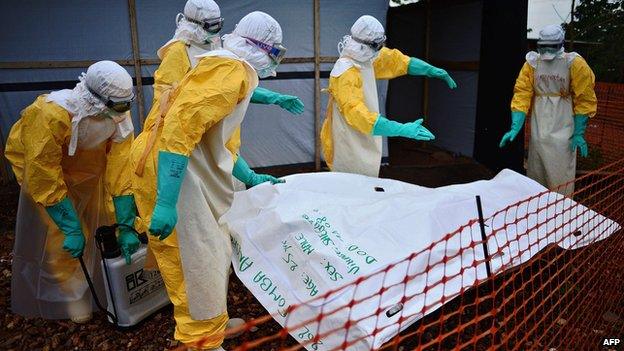Australia to contract private medical firm to fight Ebola
- Published

Doctors and nurses from around the world have joined the fight against the Ebola epidemic
Australia is contracting a private company to staff and operate an Ebola treatment centre in Sierra Leone, Prime Minister Tony Abbot has said.
He said Australia would commit A$20m (ÂĢ11m; $17m) to a 100-bed treatment centre being built by the UK.
But he ruled out sending government health workers - most workers would be hired locally with international staff likely to include some Australians.
The Ebola outbreak in West Africa has killed some 5,000 people.
Most of the deaths have been in Guinea, Liberia and Sierra Leone.
Australia has been criticised for its response to the crisis, which has included the suspension of entry visas for visitors from Ebola-affected countries, as well as a refusal to send health workers to fight the epidemic.
Mr Abbott had wanted other governments to agree to evacuate any of its medical workers who contracted the disease, before sending staff.
At a press conference on Wednesday, to treat any Australian working in Ebola-impacted areas of West Africa as if they were UK citizens.
"We are not sending people over," he said. "We are ensuring there is a 100-bed treatment centre staffed and run in Sierra Leone. Aspen, an Australian health provider, is doing it."
Sierra Leone is among the countries worst hit by the epidemic
Earlier, citing officials, said any infected Australian worker would be evacuated either to the UK for treatment or to Germany under a UK arrangement.
Aspen Medical, which has provided health services for the Australia government in the past, has been running a health clinic in Liberia for several months.
The Australian government has also committed A$2m to provide logistic support for Ebola teams in West Africa, and A$2m to help ensure regional countries such as East Timor and Papua New Guinea can treat Ebola if any cases are reported there.
Mr Abbott said he expected Aspen to have some staff in Sierra Leone within days, and for the centre to be operational by the end of November.
"But we are depending on our UK partners, who are building it," he said.
Australia is also ramping up domestic preparations for possible cases of Ebola. It is increasing screening of travellers returning from West Africa, and providing health workers to assist in quarantine measures at airports.
The leader of the opposition Labor party, Bill Shorten, said the government was now moving to take up the advice of medical groups, who had recommended increasing the number of health workers treating Ebola.
But he said more needed to be done to make it easier for Australian volunteers to travel to West Africa.
"We believe the government... has not gone as far as it should to help tackle the scourge at the source," he said.